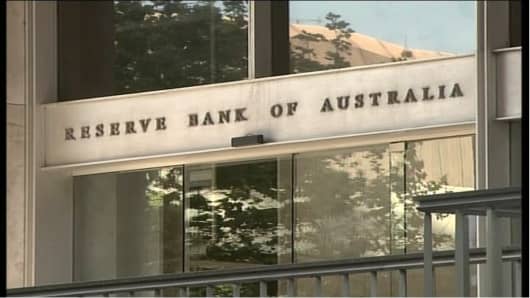Australia's central bank governor said on Friday there is already a good deal of interest rate stimulus in the economy, but reiterated the bank could lower rates further if needed given a benign inflation outlook.
Reserve Bank of Australia (RBA) Governor Glenn Stevens also said the bank has taken into consideration a stubbornly strong local dollar when setting policy.
"It is not that interest rates are seeking a particular exchange rate response, but they are being set with a recognition of the exchange rate's effect on the economy," he told lawmakers in his twice-yearly parliamentary testimony in Canberra.
"Overall, there is a good deal of interest rate stimulus in the pipeline. At its meeting earlier this month the board judged that it was sensible to allow it time to do its work. The board believed that the inflation outlook, at least as we assess it at present, would provide scope to ease further, should that be necessary to support demand."
(Read More: Australia Leaves Interest Rates Unchanged at 3%)
The Australian dollar jumped about half a U.S. cent to $1.0309 on Stevens's comments. The stock markets also got a boost, advancing 1.3 percent on Friday, even as other regional markets traded lower.
Having already slashed 175 basis points from its cash rate to a record low 3.0 percent in the past 15 months, the RBA has adopted a wait-and-see stance but with an easing bias.
The RBA is hoping to see non-mining investment pick up in time to fill any void left when resource spending crests later this year.
"Looking ahead, it appears that the peak in the level of resource sector investment is now close. It is a very high peak, but we do not think that there will be a rapid decline in the near term after the peak," Stevens said.
"However, it seems pretty clear that this type of investment will not be adding to demand for much longer."
Investment spending by businesses in other sectors has been subdued in comparison. Stevens said there are good reasons to expect it will strengthen in time but that is unlikely to happen in the very near term.
In particular, Stevens said housing investment should pick up given the low interest rate environment, strong population growth and signs that housing prices are rising.
The RBA recently trimmed its growth and inflation forecasts, expecting a below-potential growth rate of around 2.5 percent over 2013, and underlying inflation to be well contained in its 2-3 percent target band.
(Read More: What Aussie Earnings Season Says About the Economy)
Investors suspect rates might be cut further given softness in parts of the domestic economy, especially those exposed to foreign competition and the high local dollar.
Debt markets are giving a one-in-four chance of a move at the RBA's March 5 board meeting and have fully factored in the chance of a quarter-point easing over the next 12 months .
Stevens also sounded more upbeat about the global economy, noting the slowdown in China, Australia's single biggest export market, had come to an end.
"The medium-term outlook for China is for a less hectic pace of growth than we saw on average over the past decade," he said, but added the greater absolute size of the Chinese economy meant that even less rapid growth was global significant and important to Australia.


